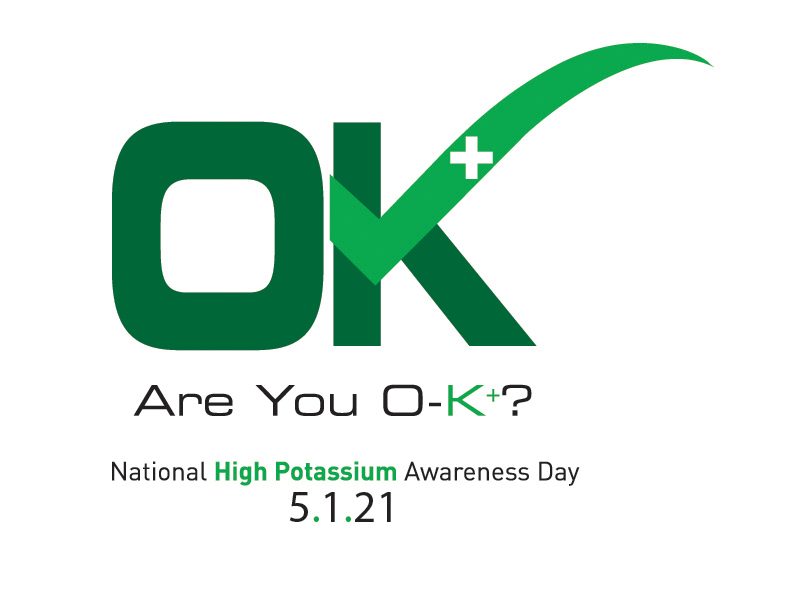ARE YOU O-K+?” CAMPAIGN PRECEDES MAY 1 USA HIGH POTASSIUM AWARENESS DAY

Tampa, FL – The American Association of Kidney Patients (AAKP), the oldest and largest fully independent kidney patient organization in the U.S., announced their second annual “Are You O-K+” campaign aimed at increasing awareness of the devastating effects high potassium (known as hyperkalemia) can have on individuals with advanced chronic kidney disease (CKD). May 1 is National High Potassium Awareness Day and AAKP’s campaign in advance of May 1st utilizes grassroot tactics and online technologies to engage and mobilize kidney patients, care partners, allied medical professional associations, and the larger kidney community. It’s estimated that nearly three million people in the U.S. with CKD and/or heart failure are living with high potassium levels.
AAKP will conclude the campaign by hosting a FREE patient education “Are You O-K+” webinar on the official awareness day, May 1, 2021. Register today at www.areyouok.org or click here. All individuals who participate in the live webinar on 5.1 will receive a complimentary AAKP Delicious! recipe pack, which features kidney-friendly recipes, and AAKP’s Pocket Guide to Managing High Potassium. The webinar will be recorded and available OnDemand after May 1 for enduring education. AAKP’s most recent webinar on nutrition related issues “Nutrition & COVID-19: The Importance of Keeping it Kidney Friendly” is available OnDemand.
Potassium is found naturally in many foods such as fruits and vegetables and it is also found in high concentrations in some processed foods and juices, like tomato juice and fruit juice. It is an important mineral that plays a key role in controlling the function of nerves and muscles, particularly the heart. In a person without kidney disease, most of the extra potassium eaten in the diet is removed by the kidneys. But when kidney function decreases to a certain level, the body cannot get rid of excess potassium. If potassium levels become too high (for example, if too much potassium is taken in and kidney function is not good enough to remove the extra potassium, or if potassium levels rise due to certain medications), then an individual is diagnosed with hyperkalemia (high potassium), a serious and potentially life-threatening condition.
The “Are You O-K+” campaign utilizes the scientific symbol of potassium “K+” with a popular message, “Are You Ok” to encourage individuals with kidney diseases to know their potassium level. The safe range for blood potassium level is under 5.1 (3.5 -5.0 mEq/L). Levels of 5.1 and higher may indicate hyperkalemia – therefore making May 1 (5.1) the key time for this annual Awareness Day.
“In 2020, the inaugural year of our national potassium awareness campaign, AAKP reached over 2.5 million people utilizing our sophisticated social media platforms and grassroots engagement networks. For 2021, AAKP will vigorously expand our reach and educational products to include online, digital, and print so that kidney patients, their medical teams, and our allies across the kidney community can support this national grassroots movement to mark May 1(5.1) as National High Potassium Awareness Day,” states Richard Knight, AAKP President, and 14-year transplant recipient. “We are honored to lead this awareness day campaign which is supported by a corporate contribution from Vifor Pharma.”
“We’re proud to continue our successful partnership with the AAKP to help raise awareness among kidney and heart disease patients about high potassium,” said Gregory Oakes, President North America, Vifor Pharma. “High potassium day provides numerous opportunities for patients to learn about the risk of high potassium and understand how high potassium can impact them. This campaign aligns with our commitment to patients, and to empowering patients to become better educated about their disease.”
AAKP Vice President Edward V. Hickey, III, USMC, stated, “The COVID-19 pandemic has exacerbated serious issues related to a food availability, access to kidney-friendly foods, and the ability to maintain a safe, nutritional balance. This has been especially true for those at-risk and suffering from kidney disease, and in particular, among people living in “food deserts,” those who may be overreliant on processed foods and without access to nutrition education resources. AAKP is committed to battling against dangerously high potassium levels and we welcome the opportunity to share new educational resources.” Hickey serves as Chair of the AAKP Veterans Health Initiative.
For more information on the “Are You O-K+” campaign and the available educational resources, visit www.areyouok.org. Get involved on social media and help spread the work by downloading the campaign toolkit and follow us on Facebook @areyouok5point1, Instagram @areyouok5point1, and Twitter @areyouok5point1. For more information about AAKP’s educational and advocacy programs, visit www.aakp.org or join today as a FREE member at www.aakp.org/join.
###
Since 1969, AAKP has been a patient-led organization driving policy discussions on kidney patient consumer care choice and treatment innovation. By 1973, AAKP patients had collaborated with the U.S. Congress and White House to begin American dialysis coverage for any person suffering kidney failure, a taxpayer effort that has saved over one million lives. In 2018, AAKP established the largest U.S. kidney voter registration program KidneyVoters™. Over the past decade, AAKP patients have helped gain lifetime transplant drug coverage for kidney transplant recipients (2020); new patient-centered policies via the White House Executive Order on Advancing American Kidney Health (2019); new job protections for living organ donors from the U.S. Department of Labor (2018); and Congressional legislation allowing HIV positive organ transplants for HIV positive patients (2013).Follow AAKP on social media at @kidneypatient on Facebook and @kidneypatients on Twitter and visit at www.aakp.org.
MEDIA CONTACT:
Jennifer Duplessie
Marketing and Communications Manager
(813) 400-2394


















